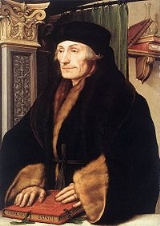
Renaissance humanist, Catholic
priest, and a theologian
.
Erasmus was a classical scholar who wrote in a pure Latin style and enjoyed the sobriquet
"Prince of the Humanists." He has been called "the crowning glory of the Christian humanists." Using humanist techniques for working on texts, he prepared important new Latin
and Greek editions of the New Testament.
I consider as lovers of books not those who keep their books hidden in their store-chests and never handle them, but those who, by nightly as well as daily use thumb them, batter them, wear them out, who fill out all the margins with annotations of many kinds, and who prefer the marks of a fault they have erased to a neat copy full of faults.![]()
A constant element of enjoyment must be mingled with our studies, so that we think of learning as a game rather than a form of drudgery, for no activity can be continued for long if it does not to some extent afford pleasure to the participant.![]()
You must acquire the best knowledge first, and without delay; it is the height of madness to learn what you will later have to unlearn.![]()
Do not be guilty of possessing a library of learned books while lacking learning yourself.![]()
Ad Graecas literas totum animum applicui; statimque, ut pecuniam acceptero, Graecus primum autores, deinde vestes emam.![]()
In regione caecorum rex est luscus.![]()
The most disadvantageous peace is better than the most just war.![]()
For what is life but a play in which everyone acts a part until the curtain comes down?![]()
This type of man who is devoted to the study of wisdom is always most unlucky in everything, and particularly when it comes to procreating children; I imagine this is because Nature wants to ensure that the evils of wisdom shall not spread further throughout mankind.![]()

